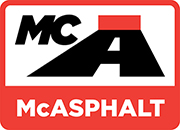Fog Seals
A fog seal is a light application of asphalt emulsion to an existing paved asphalt surface. This type of maintenance treatment is primarily employed as an impervious sealer that will slow the rate of weathering of the asphalt in the underlying pavement.
Design Criteria
When designing a fog seal a number of factors have to be examined and assessed to ensure a proper surface will be placed that will perform for its service life. The following factors can have a tremendous effect on the performance of a fog seal; traffic, aggregate shape, existing surface and residual asphalt content. If these factors are addressed the chances of a good fog seal being placed are greatly increased.
Traffic:
The type and quantity of traffic will have a large effect on the amount of asphalt emulsion to be used as well as the emulsion type.
Aggregate Shape:
If an aggregate is needed to inhance surface friction then a sharp clean sand would be required.
Existing surface:
The texture and condition of the existing road surface will affect the aggregate if needed, quantity and spray rate. A dry porous road surface may need a higher quantity of emulsion.
Asphalt Residual in the Emulsion:
The quantity of asphalt residual in the emulsion can affect the quantity of emulsion needed. The lower the residual the higher the quantity of asphalt emulsion needed.
If these factors are taken into consideration in designing the fog seal then the chances of a successful seal are greatly improved. Typically a fog seal would require an emulsion application rate of 0.45 – 0.70 l/m² and a sand cover aggregate quantity of 3 – 6 kg/m² if needed.
Materials
Asphalt Emulsions:
A number of different types and grades of asphalt emulsion can be used in fog seals. The proper emulsion to be used has to be determined by running compatibility tests between the emulsion and the aggregate to be used. Typically the most common emulsions used are SS-1, SS-1h, CSS-1, CSS-1h, MS-1 and HFMS-1. Typically the SS and CSS emulsions are diluted 50/50 with water and the medium setting grades are diluted 50/50 by the emulsion manufacturer.
Performance Guidelines
In order to construct a proper well designed fog seal the following guidelines should be followed:
- Evaluate road surface
- Design a fog seal with aggregate to be used on job if needed
- Use a clean sand
- Ensure compatibility of aggregate and emulsion
- Calibrate and inspect all equipment
- Follow proper construction techniques
- Use traffic control to protect seal
- Work only in weather suitable for type and grade of emulsion being used
